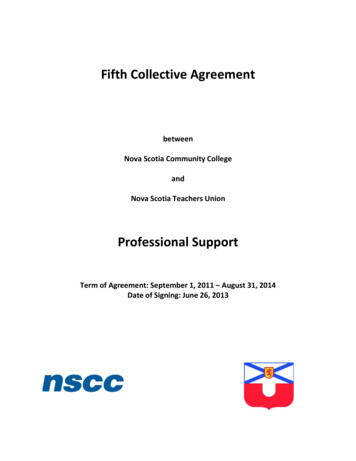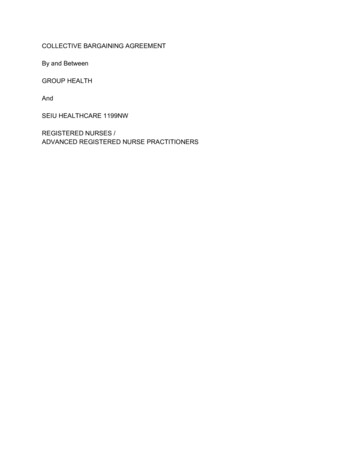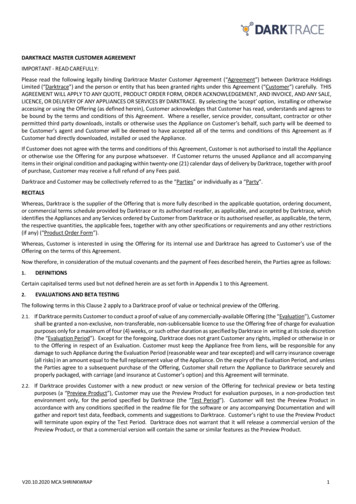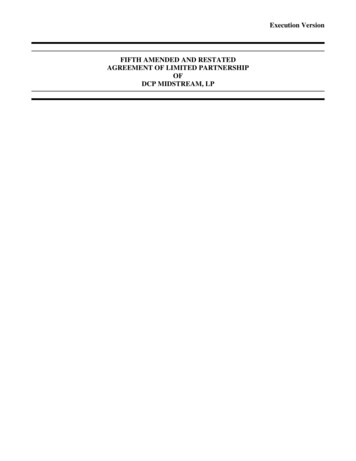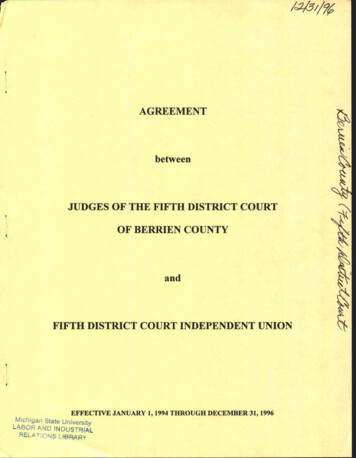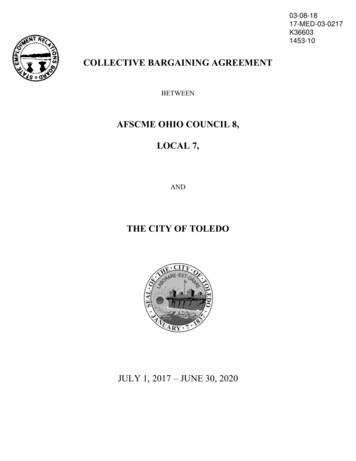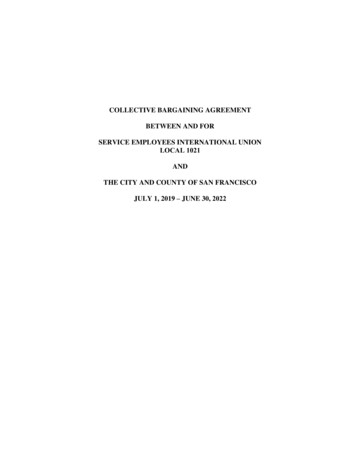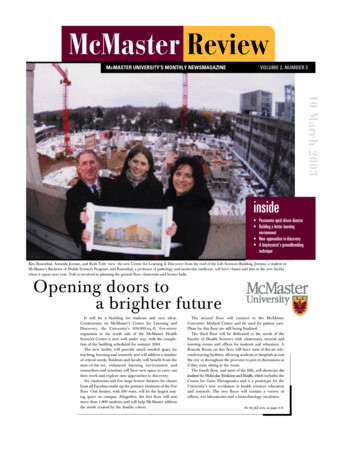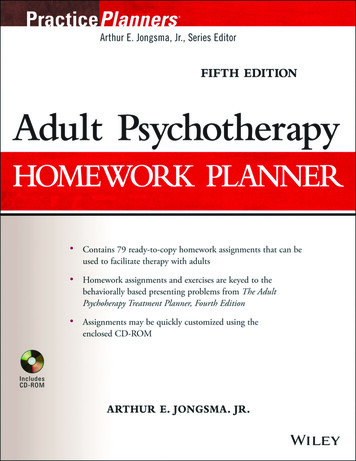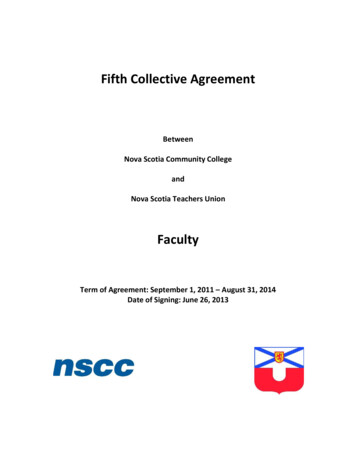
Transcription
Fifth Collective AgreementBetweenNova Scotia Community CollegeandNova Scotia Teachers UnionFacultyTerm of Agreement: September 1, 2011 – August 31, 2014Date of Signing: June 26, 2013
Table of ContentsPREAMBLE1ADMINISTRATION OF AGREEMENTArticle 1: Definitions . 2Article 2: Recognition . 3Article 3: Application . 4Article 4: College’s Responsibilities . 5Article 5: Joint Responsibilities . 5Article 6: Existing or Future Legislation . 6Article 7: Harassment and Discrimination . 6Article 8: Union Information . 7Article 9: College-Union Committee. 7Article 10: Printing and Distribution of Collective Agreement . 8Article 11: Complaint, Grievance and Arbitration Procedure . 8STAFFINGArticle 12: Workplace Diversity . 14Article 13: Appointment and Termination of Employment . 15Article 14: Position Categories . 19Article 15: Status of Faculty Member . 22Article 16: Reduced Instructional Assignment Plan . 27Article 17: Faculty Exchange, Secondment, and Temporary Reassignment Opportunities . 30Article 18: Auxiliary Faculty Members. 33WORKING CONDITIONSArticle 19: Faculty Duties. 35Article 20: Professional Development: Supporting Excellence in Teaching and Learning . 39Article 21: Performance Review - Building Employee Success. 49Article 22: Faculty Salary Plan . 50Article 23: Union Deductions . 51Article 24: Official Employment File . 52Article 25: Continuous Employment, Continuous Service, and Seniority . 54Article 26: Position Reductions, Lay-Off, and Reinstatement . 58Article 27: Health and Safety . 67Article 28: Third Party Liability Insurance. 67Article 29: Legal Assistance and Protection . 67Article 30: Discipline . 68i
LEAVEArticle 31: Vacation . 69Article 32: Recognized Holidays . 74Article 33: Sick Leave . 75Article 34: Pregnancy, Parental, Spousal, and Adoption Leaves . 82Article 35: Bereavement Leave . 86Article 36: Special Circumstances Leaves . 87Article 37: Union Leave . 92Article 38: Leave for Union President. 94BENEFITSArticle 39: Retirement . 95Article 40: Re-employment Following Early Retirement . 96Article 41: Health and Welfare Benefits . 97Article 42: Deferred Salary Leave Plan . 98CONCLUSIONArticle 43: Amendment . 101Article 44: Entire Agreement . 101Article 45: Term of Collective Agreement . 101Schedule 1: Faculty Salary Plan . 103Schedule 2: Service Award . 114Schedule 3: Public Service Award. 117Schedule 4: College Service Award. 119Appendix 1: Vacation Entitlement Calculations . 119Appendix 2: Health & Welfare Benefits –NSTU Plan . 123Appendix 3: Injury on Duty and LTD (Public Service Superannuation Plan) . 126Letter of Understanding #1: Interpretation of Campus . 127Letter of Understanding #2: Community College Master Agreement . 127Letter of Understanding #3: Faculty Salary Plan . 127Letter of Understanding #4: Effective Date. 131Outline - Article 11: Complaint, Grievance, and Arbitration Procedure . 132Outline - Article 26: Position Reductions, Lay-off, Reinstatement. 134ii
PreambleWhereas the Nova Scotia Community College is a post-secondary institution and is responsible forenhancing the economic and social well-being of Nova Scotia by meeting the occupational trainingrequirements of the population and the labour market of the Province by offering education and trainingand related services for full- and part-time students;AndWhereas the College is committed to becoming a Learning-Centered College, its objective is to provide themost learning-centered experience possible for students;AndWhereas it is the desire of both parties of this Collective Agreement to:(a)promote the well-being of Faculty Members and students so that the people ofNova Scotia will be well and efficiently served;(b)maintain harmonious relationships among the College, the Union and FacultyMembers;(c)settle terms and conditions of employment among the College, the Union, andFaculty Members;(d)create an environment which values and respects all College staff, students andclients; and(e)recognize the value of joint discussion without diminishing any contractualprocedures or rights contained within this Collective Agreement;Therefore, the parties agree as follows:1
Administration of AgreementArticle 1: DefinitionsIn this Collective Agreement:Academic Year means the twelve (12) month period commencing on the fifteenth (15th) day of August inany calendar year and ending on the fourteenth (14th) day of August in the year following.Assignment means the assigned instructional and related duties of a Faculty Member, as determined bythe College.Campus means an organizational unit necessary to provide administrative structure for the supervision ofinstructional programs and services. For administrative purposes, a Faculty Member shall be assigned to aspecific campus.Casual Person means any person hired to instruct nine (9) or fewer instructional contact hours per weekfor non-core programs or six (6) or fewer instructional contact hours per week for core programs and/orfour (4) or fewer consecutive weeks annually. Casual persons are not covered by the terms of thisCollective Agreement.College means the Nova Scotia Community College, a Body Corporate, established pursuant to theCommunity Colleges Act. The College is the Employer.Community College Education Diploma Program (CCEDP) means the College’s mandatory educationaldevelopment program that must be successfully completed by all Faculty Members as a pre-requisite forconsideration for appointment to regular status.Core Programs means those programs for which the College grants a certificate, diploma, or advanceddiploma and includes the Nova Scotia High School Graduation Diploma for Adults. Core programs are opento fee or tuition paying students according to the tuition structure of the College approved annually by theDepartment of Labour and Advanced Education.Day means any twenty-four (24) hour period beginning at midnight, including Saturdays, Sundays andholidays.Exchange means an arrangement, approved by the College, whereby a Faculty Member exchangesassignments with another Faculty Member or other person employed by the College or a person employedby an external organization for a period not greater than thirty-six (36) months.External Secondment means a temporary assignment of a person external to the bargaining unit to abargaining unit position for a period not greater than thirty-six (36) months.Faculty or Faculty Member means a person who performs instructional and related professionalresponsibilities in the bargaining unit covered by this Collective Agreement.2
Faculty Secondment means an assignment of up to thirty-six (36) months, in another organizational unit ofthe College or with an organization external to the College where the Faculty Member may be performingduties of a comparable or different nature to those of the Faculty Member’s position.Immediate Supervisor means a person, designated by the College, in a non-bargaining unit position towhom the Faculty Member reports.Instructional Contact Hour (ICH) means a period of sixty (60) minutes of assigned instructionalresponsibilities with a class. Time necessary to move between classes shall be allotted within the sixty (60)minutes where required. ICHs shall be assigned by the College.Leave of Absence means a period during which a Faculty Member is absent from work with the College’sapproval.Non-Core Program means any course or group of courses other than those included in a coreprogram.Program means a course or group of courses that leads to the granting of a College or campuscredential.Province means the Province of Nova Scotia.Student Christmas Break means that period between the fall and winter semesters including Christmas Day,New Year’s Day, the intervening days and other such working days during which the College does not scheduleinstructional contact hours. Such dates to be determined by the College.Student Winter Break means a one-week period in the winter semester during which the College does notschedule instructional contact hours. Such dates to be determined by the College.Temporary Reassignment means an assignment in the bargaining unit created by and for the College for adefined and specific purpose and for a specific period of time for up to thirty-six (36) months.Union means the Nova Scotia Teachers Union.Working Day or Work Day means any scheduled day during which a Faculty Member is assigned toperform duties by the College. Unless otherwise specified in this Collective Agreement, a scheduled dayshall be within the period inclusive of the days Monday through Friday each week.Working Hour means an hour during which the College has scheduled a Faculty Member toperform assigned duties.Work Year means the academic year.3
Article 2: RecognitionExclusive Bargaining Agent2.1The College recognizes the Nova Scotia Teachers Union as the exclusive bargaining agent for theFaculty Bargaining Unit.Bargaining Unit Inclusions2.2Except as provided in clause 2.3, the Faculty Bargaining Unit is comprised of all probationary,regular, term or auxiliary Faculty Members in position categories defined in Article 14: PositionCategories employed to perform theoretical and practical instructional responsibilities as describedin Article 19: Faculty Duties.Bargaining Unit Exclusions2.3The Faculty Bargaining Unit shall exclude the following:(a)persons holding positions of President, Vice President, Principal, Dean or Academic Chair;(b)persons holding positions of Manager, Director, or any other position provided suchpositions meet the criteria for bargaining unit exclusion as set out in paragraph (a) ofsubsection (2) of Section 2 of the Trade Union Act. RS, c.475, s.1.;(c)persons employed on a casual basis;(d)persons employed by the College whose primary responsibilities are non-instructional innature but who are assigned to instruct in credit courses for not more than the equivalentof four (4) instructional contact hours weekly in any academic year;(e)persons on secondment or exchange from an organization external to the College;(f)students employed on cooperative education programs and persons hired undergovernment-sponsored programs working under the direction and supervision of a FacultyMember. (The employment of such persons and students shall neither reduce, alter, ordiminish the number of bargaining unit positions nor reduce or diminish theresponsibilities of a Faculty Member.)Article 3: ApplicationParties Bound3.1This Collective Agreement applies to and is binding upon the Union, the Faculty, and the College.Those bound by this Collective Agreement shall carry out in a reasonable manner the provisions ofthe Agreement.Program Renewal3.2To ensure College programs are viable to the present and future needs of those served, the Collegeassesses its programs on an ongoing basis. The College shall invite one representative of the Unionto a meeting with the Deans of Academic Schools twice annually for the purpose of discussingtrends in program development and renewal. The first meeting shall be held not later than4
November 30 and the second meeting not later than March 31 each academic year. The Unionmay also request a third meeting, and the College shall accommodate the request.3.3No existing core program shall be arbitrarily discontinued, but the decision to discontinue a coreprogram, or section(s) thereof, shall be non-grievable.3.4The offering of a non-core program at a campus shall not result in the cancellation of anexisting core program(s) at that campus.Article 4: College’s Responsibilities4.1The management and direction of all Faculty Members and operations are vested exclusively in theCollege. All the functions, rights, power and authority which the College has not specificallyabridged, deleted or modified by the written, specific provisions of this Collective Agreement or byamendments to this Collective Agreement made in accordance with clause 43.1 are recognized bythe Union as being retained by the College.4.2The responsibilities of the College include, but are not limited to, the following:4.3(a)to hire, assign, promote, demote, transfer, evaluate, direct, lay off, discipline or terminatethe employment of Faculty Members;(b)to plan and control all aspects of programs and services;(c)to establish and determine positions and vacancies, evaluate jobs, classify positions,establish qualification requirements of Faculty Members and specify Faculty Members’duties;(d)to change existing facilities;(e)to enforce such operational requirements as stipulated by legislation or regulation.It is agreed that the exercise of the responsibilities of the College is subject to the provisions of thisCollective Agreement and that the College shall not in the discharge thereof act in a mannercontrary to any said provision.Article 5: Joint ResponsibilitiesNo Strike or Lockout5.1The College shall not cause a lockout nor shall Faculty Members strike during the term of thisCollective Agreement.(a)Lockout includes the closing of a place of employment, a suspension of work or a refusal bythe College to continue to employ a number of its Faculty Members forthe purpose of compelling Faculty Members, or of aiding another employer to compel itsemployees, to agree to terms or conditions of employment.5
(b)Strike includes a cessation of work or refusal to work or continue to work by FacultyMembers - in combination, concert, or accordance with a common understanding - for thepurpose of compelling the College to agree to terms or conditions of employment or to aidpersons employed by other employers to agree to terms or conditions of employment.No Sanction of Strike5.2The Union shall not sanction, encourage, or support a strike by its members during the term of thisCollective Agreement.Commitments Via Written Letter5.3The College and the Union shall respect the commitments made through the exchange of writtenletters during the collective bargaining process for this Collective Agreement.Article 6: Existing or Future Legislation6.1In the event that any provision of this Collective Agreement conflicts with any provision of theCommunity Colleges Act or any other enactment, the provision of the Community Colleges Act orother enactment shall prevail.6.2Neither the Union nor the College shall request the Governor-in-Council or the Ministerresponsible for the College to make changes to the Regulations pursuant to the CommunityColleges Act which would have the result of nullifying or restricting the provisions of this CollectiveAgreement without notifying the other party.6.3In the event that any law passed by the Legislature of the Province or any regulation madepursuant to the Community Colleges Act renders null and void any provision of this CollectiveAgreement, the remaining provisions of this Collective Agreement shall remain in effect for theterm of the Collective Agreement. The parties agree to attempt to negotiate a mutually acceptablealternative that is not inconsistent with the intent of the law or regulation for the provision whichhas been rendered null and void.6.4Where any law directly applies to Faculty Members covered by this Collective Agreement andresults in greater rights or benefits than those contained in this Collective Agreement, such rightsand benefits shall, at the request of either party, form part of this Collective Agreement and shallautomatically accrue to the benefit of Faculty Members covered by this Collective Agreement.Article 7: Harassment and DiscriminationNo Discrimination7.1Neither the College nor any person acting on behalf of the College shall refuse to employ ordiscontinue employment of any Faculty Member, or otherwise discriminate against any FacultyMember in regard to employment or any term or condition of employment, because the FacultyMember is or was a member of the Union or is or was exercising any right under this CollectiveAgreement or the Trade Union Act. R.S., c.475, s.1.7.2Neither the College nor the Union nor any person acting on behalf of either party shall discriminateagainst any Faculty Member as specified under the Nova Scotia Human Rights Act. R.S., c.214, s.1.6
Policy and Procedures7.3The College shall establish and maintain a policy and procedures on harassment and discrimination.7.4The procedures shall include the process for handling complaints and investigations.7.5The College shall be responsible for communicating the Harassment and Discrimination Policy andProcedures to its Faculty Members and the Union. Any changes to the Policy or Procedures shallinclude consultation with the Union prior to implementation.Investigation and Discipline7.6Should a Faculty Member be the complainant or respondent in an investigation, the FacultyMember shall have the right to have Union representation at all meetings involving the FacultyMember. At the conclusion of an investigation, a Faculty Member shall have the right to grieve anydisciplinary action imposed by the College in accordance with Article 11: Complaint, Grievance andArbitration Procedure.Article 8: Union InformationBulletin Boards8.1The College shall designate bulletin board space for the posting of Union notices pertaining toelections, appointments, meeting dates, news items, social and recreational affairs.Union Literature8.2The College shall, where facilities permit, make available to the Union specific locations on itspremises for the placement of bulk quantities of literature of the Union.Article 9: College-Union CommitteePurpose9.1A College-Union Committee shall be established consisting of up to four (4) Faculty Memberrepresentatives from the Union and up to four (4) representatives from the College one of whomshall be the Vice President (Academic). If the Vice President (Academic) is unable to attend, aperson who reports directly to the Vice President (Academic) shall be the replacement. Either partymay have the assistance of a representative at any meeting. The mandate of the Committee is to:(a)facilitate communications between the College and the Union during the duration of thisCollective Agreement;(b)identify and resolve common problems during the duration of this Collective Agreement.Mandate9.2The College-Union Committee shall not have jurisdiction over salaries or any matter of collectivebargaining, including the administration of this Collective Agreement. The College-UnionCommittee shall not supersede the activities of any other committee of the College or of the Unionand does not have the power to bind either the College or the Union or its members to anydecisions or conclusions reached in its discussions. This Committee may make recommendations tothe College and the Union with respect to its discussions and conclusions.7
Meetings9.3The College-Union Committee shall meet at a mutually agreeable date and time. Unless otherwisemutually agreed, there shall be a minimum of three (3) meetings per year. These meetings shallnormally be held during working hours. Matters for the proposed agenda to be discussed at anymeeting shall be exchanged by the parties at least three (3) working days prior to the meeting.Release from Duty9.4Faculty Members on the College-Union Committee may be released from duty without loss of payfor the purpose of attending meetings of this committee. Such leaves of absence shall not beunreasonably withheld recognizing, however, the need for efficiency of operations of the College.Expenses9.5Travel, meal and accommodation expenses for the Union representatives shall be paid by theUnion. The College shall reimburse the Union for fifty percent (50%) of the travel, meal andaccommodation costs incurred for the four (4) Faculty representatives. Reimbursement of traveland meal expenses shall be in accordance with College policy.Minutes9.6Two (2) copies of the minutes of each meeting of the College-Union Committee [one (1) for eachparty] shall be prepared and distributed to the Committee as promptly as possible after themeeting. The College shall post approved minutes on the College’s ourNSCC within five (5) workingdays following the next meeting of the Committee.Article 10: Printing and Distribution of Collective AgreementCopies of Agreement10.1The College shall provide an electronic copy of the Faculty Collective Agreement on ourNSCC, theCollege website for staff.10.2The College shall provide the link to the electronic copy of the Collective Agreement to each newFaculty Member upon commencement of employment.10.3The College shall provide a reasonable number of copies of this Collective Agreement to the Union.10.4The College shall also provide a hard copy of this Collective Agreement to any Faculty Member whoso requests prior to the printing.Article 11: Complaint, Grievance and Arbitration ProcedurePurpose11.1 (a)The College, the Union and Faculty Members recognize the desirability of promptresolution of complaints and grievances through an orderly process without stoppage ofwork or refusal to perform work. The process comprises three sequential stages:complaint, grievance and arbitration. Except as provided in this article, the complaint stageis a prerequisite for proceeding to the grievance stage. The grievance stage is aprerequisite for proceeding to the arbitration stage.8
(b)Notwithstanding clause 11.1 (a), in extraordinary circumstances and subject to theapproval of the grievor, the parties may agree to bypass an internal step or proceeddirectly to the arbitration stage.Complaint Stage11.2 For the purpose of reaching a solution through an informal process, a Faculty Member who feelsunjustly treated by any action or lack of action by the College - including matters that meet thedefinition of a grievance in clause 11.4 - shall first discuss that complaint with the FacultyMember’s immediate supervisor. This shall be done not later than twenty-one (21) days after thecircumstances giving rise to the complaint have occurred or of the date the matter has, or oughtreasonably to have, come to the attention of the Faculty Member. The Faculty Member may havea Union representative present if so desired by the Faculty Member. The immediate supervisor’sresponse to the complaint shall be given not later than fourteen (14) days after the discussionwith the Faculty Member.Grievance Stage11.3 The following may initiate a grievance:(a)a Faculty Member on the Faculty Member’s own behalf or on behalf of the FacultyMember and one or more other Faculty Members (in the latter case, all Faculty Memberson whose behalf the grievance is submitted shall affix their signatures to the writtengrievance);(b)the Union;(c)the College;and, in so doing, shall be referred to as a “grievor”.Definition of Grievance11.4 A grievance is defined as a dispute in writing concerning the application, interpretation, or allegedviolation of an article or articles of this Collective Agreement. A grievance shall be submitted inwriting and shall include a description stating the nature of the grievance and the article(s) of thisCollective Agreement that have allegedly been violated together with the redress requested. Thegrievance shall be signed by the grievor and may be clarified by the grievor providing the substanceof the grievance is not changed. The reasons supporting the grievance shall be set out in thegrievance. Additional reasons or article(s) of this Collective Agreement that have allegedly beenviolated that become known to the grievor subsequent to the submission of the grievance may beadded to the grievance at the time they become known to the grievor by notifying the respondentin writing at that time. The redress stated in the grievance shall not limit the resolution that can besought by the grievor. The lack of specificity of the reasons shall not, in itself, be cause fordisallowing a grievance. In the case of a Faculty-initiated grievance, the Union may act on behalf ofthe Faculty Member at step one of the grievance including signing the grievance when authorizedby the grievor.9
Withdrawal of Grievance11.5 A grievor may withdraw a grievance at any step of the grievance/ arbitration process by givingwritten notice to the respondent. The respondent to a Faculty- initiated or Union-initiatedgrievance is the College. The respondent to a College- initiated grievance is the Union.Grievance Deemed Abandoned11.6 If a grievor fails to initiate or process a grievance within the time limits prescribed in this article, thegrievance shall be deemed to be abandoned, and all rights of recourse to the grievance andarbitration procedures under this Collective Agreement shall be at an end. If the respondent fails toreply to a grievance within the prescribed time limits, the grievance may be processed to the nextstep. The parties may, by agreement in writing, extend the time limits, providing such extension isrequested prior to the expiry of the time allowed.Grievance: Faculty-InitiatedGrievances Not Concerning Suspension, Discharge From Employment, or Lay-offStep 111.7 (a)If an issue is not resolved satisfactorily at the complaint stage and the complaint meets thedefinition of a grievance stipulated in clause 11.4, the Faculty Member shall submit thegrievance in writing along with the redress requested to the Seni
Fifth Collective Agreement Between Nova Scotia Community College and Nova Scotia Teachers Union Faculty

